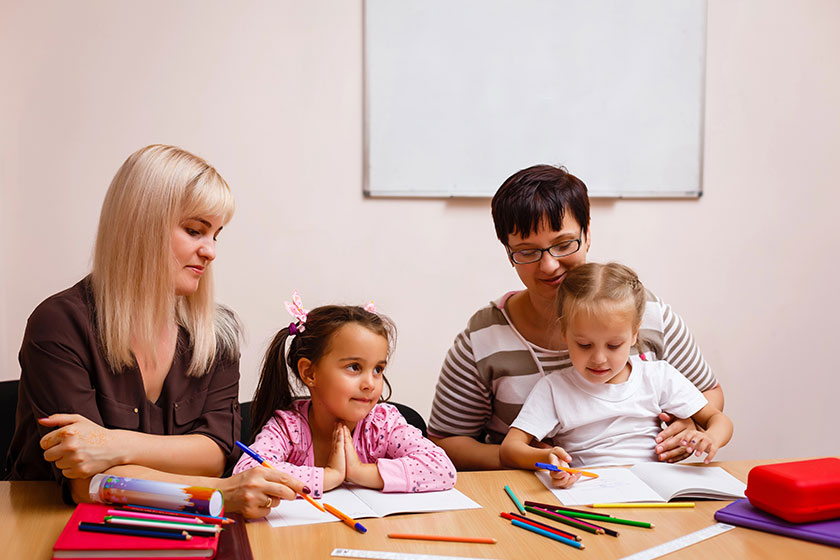
BCBAs and Collaboration: Working with Families and Schools for Success
At Prism Learning Center, we understand that the success of children, especially those with autism or other developmental challenges, requires more than just effective therapy; it involves a BCBA family-school partnership that promotes consistent support and collaboration. Board Certified Behavior Analysts (BCBAs) play a critical role in this partnership, working alongside parents, teachers, and other professionals to ensure that children receive the most effective, individualized interventions.
This blog will explore how BCBAs collaborate with families and schools to support children’s development, improve their social and academic success, and ensure that interventions are tailored to meet the specific needs of each child. Whether you’re a parent, educator, or healthcare professional, understanding the significance of this partnership can help you make the most of the resources available to your child.
What is a BCBA Family-School Partnership?
A BCBA family-school partnership refers to the collaborative relationship between Board Certified Behavior Analysts, families, and educational staff. It is an approach in which all parties work together to support the child’s progress in both the home and school environments. This teamwork ensures that behavior interventions are consistent, targeted, and adapted to each setting, which is crucial for children with autism and developmental delays who may struggle with generalized learning.
In this partnership, BCBAs use their expertise in behavior analysis to provide guidance, develop individualized treatment plans, and monitor progress. Meanwhile, families and school staff contribute their unique perspectives, ensuring that interventions are effective in real-life contexts. The result is a comprehensive, multi-faceted approach to supporting the child’s growth and development.
Why is the BCBA Family-School Partnership Important?
A successful BCBA family-school partnership benefits everyone involved—especially the child. Here’s why it matters:
1. Consistency Across Environments
Children with developmental challenges often face difficulty transferring learned behaviors from one environment to another. For example, a behavior that is reinforced at home might not be as successful in the classroom if there is no coordination between the family and school. By collaborating, BCBAs, teachers, and parents can ensure that behavior strategies are consistent across settings, helping children generalize new skills and behaviors.
2. Holistic Approach to Treatment
Every child is unique, and their progress can be influenced by many factors, including family dynamics, classroom settings, and peer relationships. A BCBA family-school partnership allows for a holistic approach to treatment. BCBAs can gain valuable insights from both home and school environments, leading to better decision-making about the child’s needs. This ensures that the child receives comprehensive support tailored to their individual strengths and challenges.
3. Improved Communication and Understanding
Open communication between BCBAs, families, and schools is essential for progress. Regular collaboration fosters mutual understanding and trust between parents, teachers, and behavior analysts. With clear communication channels, families and schools can share feedback, successes, and challenges. This collaborative dialogue strengthens the overall support system for the child, making interventions more effective.
4. Better Social and Academic Outcomes
When BCBAs collaborate with families and schools, they help children develop skills that are essential not only for behavior management but also for success in social and academic settings. Whether it’s learning how to interact with peers, follow instructions, or participate in group activities, the collective support of all parties improves the child’s ability to thrive in both environments.
How Do BCBAs Collaborate with Families and Schools?
BCBAs use various strategies and methods to collaborate with families and schools, ensuring that interventions are cohesive and effective. Here are some key ways they engage with parents and teachers:
1. Conducting Comprehensive Assessments
Before developing a treatment plan, BCBAs collaborate with families and schools to conduct a thorough assessment of the child’s needs. This may include reviewing the child’s behavior at home and school, speaking with parents and teachers about specific challenges, and using standardized tools to measure progress. The insights gained from these assessments help BCBAs create a tailored treatment plan that aligns with the child’s goals.
2. Creating Individualized Behavior Intervention Plans
A central part of the BCBA’s work is developing individualized behavior intervention plans (BIPs). These plans outline specific goals for the child, strategies for teaching new behaviors, and ways to address challenging behaviors. In collaboration with families and schools, BCBAs ensure that the BIP is both feasible and effective across different settings. By incorporating input from both home and school, BCBAs can create interventions that meet the child’s needs in a comprehensive way.
3. Training Teachers and Parents
BCBAs play a crucial role in training both teachers and parents on how to implement behavior interventions effectively. This might involve teaching teachers how to reinforce positive behaviors in the classroom, providing parents with strategies to manage challenging behaviors at home, or offering guidance on communication techniques. By equipping teachers and parents with the skills they need to support the child, BCBAs help ensure that interventions are consistent and effective across both environments.
4. Regular Communication and Progress Monitoring
Continuous communication between BCBAs, families, and schools is key to monitoring the child’s progress. BCBAs often conduct follow-up meetings with parents and teachers to assess how well the behavior interventions are working, adjust strategies as needed, and address any new challenges that may arise. Regular check-ins ensure that all parties are aligned and that the child’s treatment plan is dynamic and responsive to their needs.
5. Collaborating on Social and Communication Skills
In addition to managing behavior, BCBAs focus on developing essential social and communication skills. Whether it’s teaching a child how to make friends, share with peers, or communicate needs effectively, these skills are crucial for success in both school and home environments. By working together, BCBAs, families, and school staff can create a consistent approach to teaching social skills, ensuring that children learn how to navigate different social contexts.
Overcoming Challenges in BCBA Family-School Partnerships
While the BCBA family-school partnership can lead to significant progress, there are some challenges that may arise. Here are a few ways to address them:
1. Balancing Perspectives
Families and schools may have different priorities, and it’s essential to bridge those gaps. BCBAs can facilitate open conversations to ensure that all voices are heard and that the child’s needs remain the top priority.
2. Time Constraints
Teachers and parents may have limited time to meet with BCBAs or implement behavior interventions consistently. BCBAs can address this challenge by providing easy-to-follow guidelines, offering online resources, or coordinating regular brief check-ins to ensure that progress is being made without overwhelming either party.
3. Resistance to Change
Some parents or school staff might resist behavior interventions, particularly if they are new to ABA techniques. BCBAs can help by explaining the benefits of these strategies, offering training sessions, and providing evidence of their effectiveness.
Conclusion
A strong BCBA family-school partnership is essential for achieving lasting success for children with autism or other developmental challenges. By working together, BCBAs, families, and schools can ensure that interventions are consistent, personalized, and effective in both home and school settings. Through comprehensive assessments, individualized treatment plans, training, and regular communication, this partnership supports the child’s social, emotional, and academic growth.
At Prism Learning Center, we are committed to fostering these partnerships to help children thrive in every environment. If you are looking for expert support in navigating the BCBA family-school partnership, contact us today to learn how we can help you make a meaningful difference in your child’s life.
